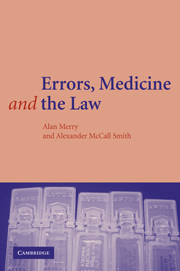7 - Assessing the standard – the role of the expert witness
Published online by Cambridge University Press: 05 October 2013
Summary
The central thesis of this book is that many incidents currently defined as negligent – in both a criminal and a civil context – do not, on close analysis, reflect significant blameworthiness. Our discussion of the standard of care concluded that this standard will tend to be driven up by the way in which it is applied in negligence litigation. The expert witness plays an important role in this process.
The court is the trier of fact in any legal action. In jury-based systems, it will be the jury that performs this role; in non-jury systems, it will be the judge. Whichever system is favoured, the task will be the same – that of deciding whether a particular fact existed. To do this, courts will listen to the evidence of those who witnessed or participated in the events under dispute. The law of evidence is designed to ensure that the court considers only that evidence that will enable it to reach a reliable conclusion. Opinion evidence – evidence about what people thought about a matter is usually excluded, as is evidence of knowledge that is indirectly obtained (the hearsay rule). Opinion evidence, however, may be allowed where the opinion is necessary to enable the trier of facts to understand the facts in question. So, for example, a witness may be asked whether, in his opinion, a person was intoxicated at the time of his observation, or whether he was in a state of distress.
- Type
- Chapter
- Information
- Errors, Medicine and the Law , pp. 176 - 203Publisher: Cambridge University PressPrint publication year: 2001



